Converse University is a private university in Spartanburg, South Carolina. It was established in 1889 by a group of Spartanburg residents and named after textile pioneer Dexter Edgar Converse. It was originally a women's college but now admits men.
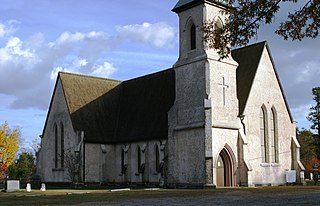
The Church of the Holy Cross is a historic Anglican church at 335 North Kings Highway in Stateburg, South Carolina. Built in 1850-52 to a design by noted South Carolina architect Edward C. Jones, it is a notable example of rammed earth construction with relatively high style Gothic Revival styling. It was designated a National Historic Landmark for its architecture in 1973.

The Church of the Holy Apostles Rectory is an historic Carpenter Gothic house located at 1700 Hagood Avenue in Barnwell, South Carolina, On April 13, 1972, it was added to the National Register of Historic Places. It is also known as the Roberts House, the Old Patterson House, or The Rectory.

Bethesda Presbyterian Church is a church in McConnells, South Carolina that was built in 1820. It was listed on the National Register of Historic Places in 1977. It was named to the National Register of Historic Places in 1977.
William Wallace Anderson was a medical doctor who graduated from the University of Pennsylvania in 1846 with a Bachelor of Arts and the University of Pennsylvania School of Medicine in 1849. He was also involved in the architecture of rammed earth construction in South Carolina. He was the son of American Revolutionary War hero Richard Anderson and father of Confederate General Richard H. Anderson.
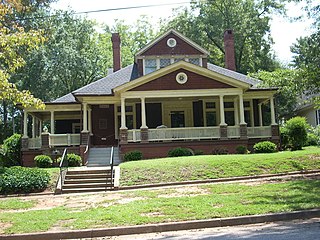
Seneca Historic District is a historic district in Seneca, South Carolina, United States, that is listed on the National Register of Historic Places.

Laurens Historic District is a national historic district located at Laurens, Laurens County, South Carolina. It encompasses 77 contributing buildings and 1 contributing structure in Laurens. The district includes residential, commercial, religious, and governmental buildings built between 1880 and 1940. Notable buildings include the Laurens County Courthouse, Old Methodist Church, St. Paul First Baptist Church, Public Square commercial buildings, Rosenblum's and Maxwell Bros. and Kinard Store, Provident Finance Co. and Parker Furniture, McDonald House, Augustus Huff House, Gov. William Dunlap Simpson House, and Hudgens-Harney House.

Coffin Point Plantation, is a historic plantation house located in the Frogmore area of Beaufort County, South Carolina, USA. A Sea Island plantation.
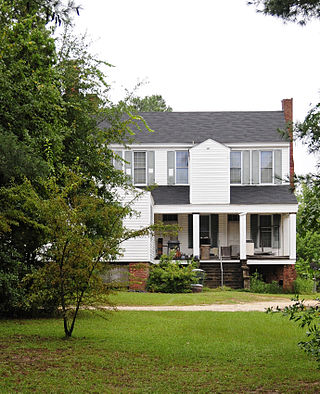
The Charles Hammond House, located at 908 Martintown Road, North Augusta, South Carolina, was built on a bluff overlooking the Savannah River between other Hammond plantations, New Richmond and Snow Hill. The Charles Hammond House was added to the National Register of Historic Places on October 2, 1973.

Cheraw Historic District is a national historic district located at Cheraw, Chesterfield County, South Carolina. The district encompasses 39 contributing buildings and 1 contributing object in Cheraw. Located within the district are varieties of architectural styles that include the early frame homes of the 1800s, antebellum structures with Classical Revival details and Greek Revival porticos, and Victorian houses from the turn of the 20th century. The district also includes several churches, a cemetery, and the towns’ original boundary markers dating from 1766. Notable buildings include Town Hall, First Presbyterian Church, St. Peter's Catholic Church, Chicola Club / Brady's Restaurant, First Federal Savings, Robert Smalls, Dizzy Gillespie and Loan, B.C. Moore and Sons, Coulter Memorial Academy Building, and Godfrey House. Located in the district is the separately listed St. David's Episcopal Church and Cemetery.

Hartsville station, also known as the Hartsville Depot, is a historic train station located at Hartsville, Darlington County, South Carolina. It was built in 1908 by the Atlantic Coast Line Railroad, and is a one-story structure typical of early 20th century railroad design. It has a hipped slate roof with a deep overhang supported by large wooden brackets. The Atlantic Coast Line discontinued this line to Hartsville in 1940, and in 1948 the station became the office for the Chairman of the Board of Directors of the Atlantic Coast Line Railroad Company.

U.S. Post Office is a historic post office building located at Florence, Florence County, South Carolina. It was built about 1906, and is a three-story, sandstone and brick building with hipped roof Second Renaissance Revival style. A major three-story addition to the rear of the building was built about 1935.

Southern Railway Passenger Depot, also known as Branchville Depot, is a historic train station located at Branchville, Orangeburg County, South Carolina. It was built in 1877 by the Southern Railway. It is a one-story, brick building with a stucco finish and hipped roof. It was the site of a speech given by President-elect William Howard Taft in 1909.
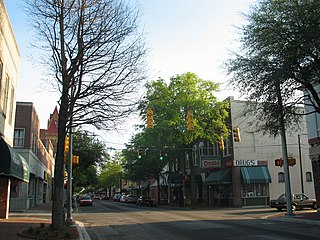
Sumter Historic District is a national historic district located at Sumter, Sumter County, South Carolina. It encompasses 62 contributing buildings in the central business district of Sumter. It includes buildings that primarily date from 1880 to 1912. They are typical of turn-of-the-20th century commercial buildings, using materials such as pressed tin, limestone, and brick. Notable buildings include the Sumter County Courthouse, Sumter Town Hall-Opera House, Lee and Moise Building, Bultman Brothers' Boots and Shoes, Bank of Sumter, and Burns Hardware.
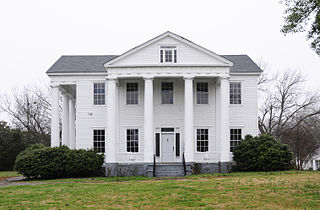
Meng House, also known as The Hill House and Clough-Wallace House, is a historic home located at Union in Union County, South Carolina, United States. It was built about 1832, and is a two-story, Greek Revival style frame dwelling. It features two two-story Doric order porticos supported by four stucco-over-brick columns. It has a two-story wing that houses the kitchen with bathrooms above.

Hampton–Pinckney Historic District is a national historic district located at Greenville, South Carolina. It encompasses 70 contributing buildings in a residential section of Greenville. The houses date from about 1890 to 1930, and include Italianate, Greek Revival, Queen Anne, various bungalows, and examples of Gothic Revival and Colonial Revival design, as well as vernacular forms. The oldest house in the district is the McBee House.
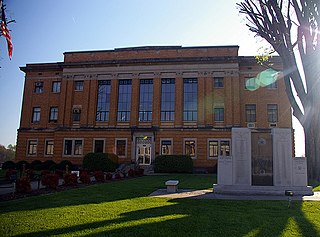
McDowell County Courthouse is a historic courthouse building located at Marion, McDowell County, North Carolina. It was designed by architect Erle G. Stillwell and built between 1921 and 1923. It is three-story, late Neoclassical building sheathed in yellow brick. The rectangular structure is composed of a central block flanked by slightly recessed, unornamented wings.



















